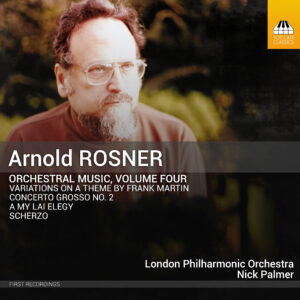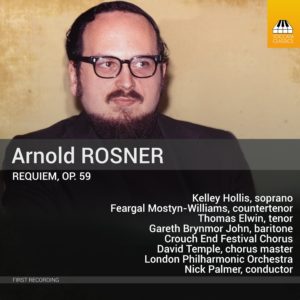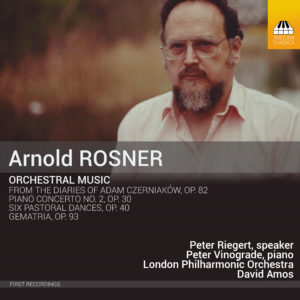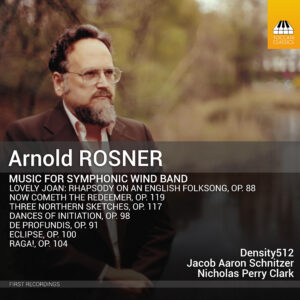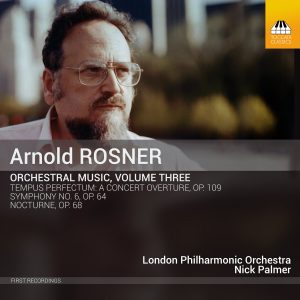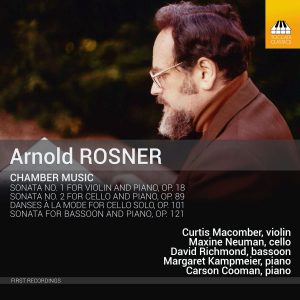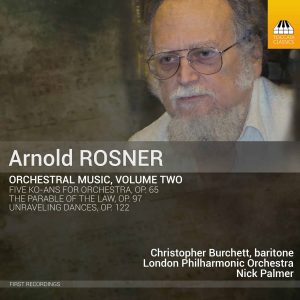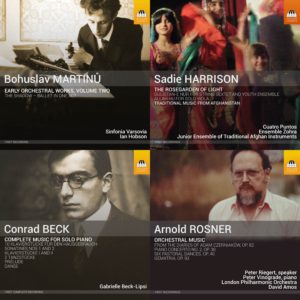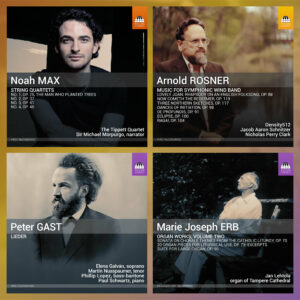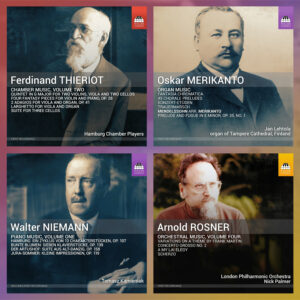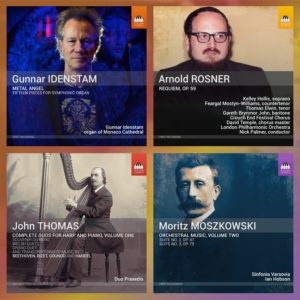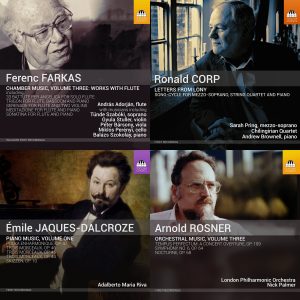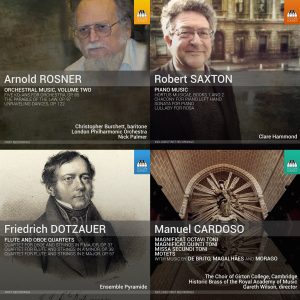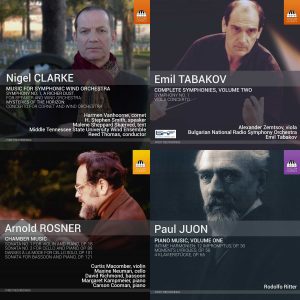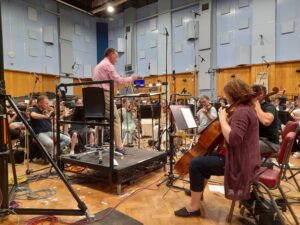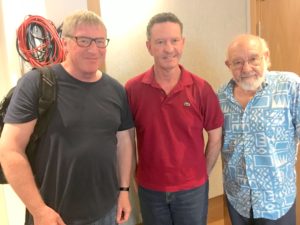Search Results for "Rosner"
Arnold Rosner: Orchestral Music, Volume Four
The musical language of the New York-based Arnold Rosner (1945–2013) clothes the modal harmony and rhythm of pre-Baroque polyphony in rich Romantic colours, producing a style that is instantly recognisable and immediately appealing. This fourth Toccata Classics album of his orchestral music opens with an engaging and energetic early Scherzo and a Concerto Grosso that has something of the dignified reserve of the Swiss composer Frank Martin, whom Rosner much admired – as the broadly expressive Variations on a Theme by Frank Martin go on to show. Rosner’s A My Lai Elegy, a symphonic poem inspired by a massacre of civilians in Vietnam, has few equals in the orchestral repertoire: it veers from profound sadness to wild, freewheeling anger – protest music at its grandest and most passionate.
London Philharmonic Orchestra
Nick Palmer, conductor
Arnold ROSNER: Requiem, Op. 59
Far from being a treatment of the usual Latin, the Requiem of the New York-based Arnold Rosner (1945–2013) sets spiritual and secular texts on death from a number of the world’s cultures, including Whitman, Villon, the Tibetan Book of the Dead, a sutra from Zen Buddhism and the Jewish Kaddish. The work of a young man (Rosner was 28 when he wrote it), this Requiem is both monumental and wildly energetic – but it also encompasses passages of transcendent beauty. His musical language clothes the modal harmony and rhythm of pre-Baroque polyphony in rich Romantic colours, producing a style that is instantly recognisable and immediately appealing. Some of the music was first written for an aborted operatic treatment of Ingmar Bergman’s film The Seventh Seal, where the main character plays chess with Death; in like spirit, Rosner’s Requiem is a major statement of human defiance in the face of mortality, even if its gentle closing pages bring uneasy acceptance
Kelley Hollis, soprano (Tracks 4,8)
Feargal Mostyn-Williams, counter-tenor (Tracks 1,7)
Thomas Elwin, tenor (Tracks 1,2,7)
Gareth Brynmor John, baritone (Tracks 1,5,7)
Crouch End Festival Chorus (Tracks 1,5,6,9)
David Temple, conductor (Track 6), chorus master (Track 1,5,9)
London Philharmonic Orchestra (Tracks 1-5, 7-10)
Nick Palmer, conductor (Tracks 1-5, 7-10)
First recording
Arnold Rosner: Orchestral Music
The musical language of the New York-based Arnold Rosner (1945–2013) clothes the modal harmony and rhythm of pre-Baroque polyphony in rich Romantic colours, producing a style that is instantly recognisable and immediately appealing. The piano concerto which opens this album reveals that his personality was present from the start: although it was written before he had any formal training in composition, its confidence and individuality are striking. The other works here show the range of Rosner’s music, from his fondness for Elizabethan dance and his exploration of symphonic minimalism to an identification with his Jewish roots, in a harrowing setting for speaker and orchestra of extracts from the diary of the leader of the Warsaw Ghetto.
Peter Vinograde, piano
Peter Riegert, speaker
London Philharmonic Orchestra
David Amos, conductor
Arnold Rosner: Music for Symphonic Wind Band
Arnold Rosner (1945–2013) was a New Yorker through and through, but his musical language reached across time and culture, clothing the modal harmony and rhythm of pre-Baroque polyphony in rich Romantic colours, thus producing a style that is instantly recognisable and immediately appealing. Having written his Eighth Symphony for symphonic wind band, he took a liking to the medium, composing seven more works for this popular feature of American university life, none of them recorded before now. Their inspiration is eclectic – from ethnic material and natural phenomena to religious stimuli – but Rosner’s unerring balance of dignity and energy is common to all of them and stamps them with a sound that is uniquely his.
Density512
Jacob Aaron Schnitzer, conductor
Nicholas Perry Clark, conductor
Arnold Rosner: Orchestral Music, Volume Three
The musical language of the New York-based Arnold Rosner (1945–2013) had its roots in the modal harmony and rhythm of pre-Baroque polyphony and evolved in an array of unusual directions, producing a style that is instantly recognisable and immediately appealing – as can be heard in the three works on this recording. Rosner’s Nocturne suggests the immensity – and the implacable violence – of outer space, whereas his overture Tempus Perfectum has its starting point in Renaissance dance. The monumental Sixth Symphony opens with music of volcanic ferocity and vehemence; the central Adagio then provides an island of troubled calm before the dignified opening of the finale presages a symphonic Allegro of wild, freewheeling energy; only when its immense force is spent does this powerful masterpiece sink to an uneasy close.
London Philharmonic Orchestra
Nick Palmer
Arnold Rosner: Chamber Music
The musical language of the New York-based Arnold Rosner (1945–2013) clothes the modal harmony and rhythm of pre-Baroque polyphony in rich Romantic colours, producing a style that is instantly recognisable and immediately appealing. These four chamber works, all receiving their first recordings, embrace a wide range of emotions, from tragic nobility to buoyant good humour, with Rosner’s use of modality adding a hint of the Orient.
Curtis Macomber, violin Tracks 1–3
Maxine Neuman, cello Tracks 4–7, 11–13
David Richmond, bassoon Tracks 8–10
Margaret Kampmeier, piano Tracks 1-3
Carson Cooman, piano 8–10
Arnold Rosner: Orchestral Music, Volume Two
The musical language of the New York-based Arnold Rosner (1945–2013) clothes the modal harmony and rhythm of pre-Baroque polyphony in rich Romantic colours, producing a style that is instantly recognisable and immediately appealing. This second Toccata Classics album of his orchestral music contrasts the high-spirited Unraveling Dances – a rhapsody with more than a nod to Ravel’s Bolero – with the powerful symphonic suite Five Ko-ans for Orchestra and Rosner’s dramatic, dark, hieratic setting of Kafka’s The Parable of the Law for baritone and orchestra.
London Philharmonic Orchestra
Nick Palmer, conductor
Christopher Burchett, baritone (Track 7)
June 2016 Bundle
Included in this bundle:
March 2025 Bundle
Included in this bundle:
February 2024 Bundle
Included in this bundle:
September 2020 Bundle
Included in this bundle:
January 2019 Bundle
Included in this bundle:
March 2018 Bundle
Included in this bundle:
July 2017 Bundle
Included in this bundle:
Raising Rosner’s Profile: More Music on the Way
There are now five volumes of the music of the New York-based Arnold Rosner (1945–2013) on Toccata Classics: three of orchestral music, one of chamber…
Reflections on Recording The Rosner ‘Requiem’
It has given me so much pleasure to read the wonderful reviews of the Rosner Requiem recording, where discerning critics have enthusiastically endorsed the great…
Stay In the Know
JOIN THE TOCCATA NEWSLETTER
"*" indicates required fields
By visiting our site, you agree to our privacy policy regarding cookies, tracking statistics, etc.
